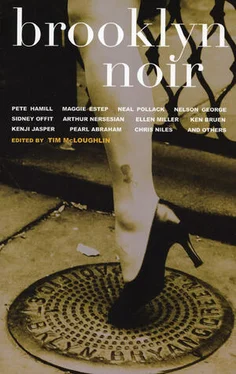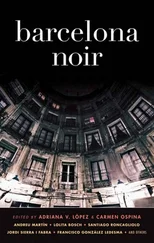I closed the book in wonder. In the standard course, such a series of events — going from initial suspicions to allegations to accusations to excommunication by the court — would span a lifetime. For all of it to have gone off in a couple of years and without much of a hitch, a well-planned program must have been in place. But who had planned so well, who had known the ins and outs of Dobrov, and who had so much private access to family members? I needed to find the children, talk to the sons, the eldest daughter too. Did they understand that they’d been used — abused, rather?
At 5, when Hasidim gather in the synagogues for the afternoon service, I turned the lock on my office door and walked to the Szebed synagogue, congregation of the murdered man’s cousin and rival for the Grand Rabbinic throne. Inside I noted the recent interior renovations to the brownstone. Exterior work was still in progress. And was it jubilation I sensed in certain members of the congregation, jubilation at the Dobrover’s death?
I took a place at the back of the room, where I would have a good view of all who came and went. During the service, I noticed an earnest young man dressed in the style of a Litvak, an outsider, his face thin and pale, an unhappy face. What was he doing here mid-week? It happened now and then that someone’s Litvak relative visited for a Sabbath and attended services in a Hasidic shtibel , but this was mid-week, when young men were at yeshiva; furthermore, this wasn’t any shtibel , it was Szebed.
After the service, a birth was announced, the name pro-claimed: Udel, daughter of Sarah. Wine, plum brandy, egg kichel, and herring were brought in, and I watched as the cup of wine was passed from relative to relative. The young man appeared to be one of them, because he too received the cup. I eyed him as he went through the motion of sipping and passed it on. Not an outsider. Definitely related. Probably a brother to the young wife, though why would a Szebeder marry into a Litvak family? I wondered.
I went up to the table, poured myself a thimble of brandy in friendly gesture, and casually asked another family man beside me, And who is the young man?
Why, Dobrov’s youngest son, brother-in-law of the new father, the man said.
Oh, I said, I didn’t recognize him now that he’s grown up — the usual nonsense adults speak, mere filler. Beneath the filler, I was beside myself. A Dobrov son dressed in the short coat and hat of a Litvak, peyos tucked behind his ears. His father and grandfathers must be churning in their graves. And where were the signs of mourning, the ripped lapel on the jacket, the loose flap on the shirt under it? There was none of that. And during the service no prayer for the soul of the deceased had been recited either. Clearly, the son wasn’t mourning the father, not openly anyway.
I mingled among the men, made my way up to the young man as smoothly as I could manage, put my hand out to wish him a mazeltov. He extended a limp, unwilling hand, responded with the merest nod. His eyes, however, scanned my face, didn’t seem to find what they wanted, and moved on. An unhappy soul, I thought, a very disturbed young man. I attempted to squeeze some reassurance into the pale thin hand, clapped it with my other hand before letting go, then taking a roundabout path made my way to the door, slipped out unnoticed, I hoped, and walked up and down the block, with an eye on the comings and goings at this house, a brownstone whose upper floors served as the Szebeder residence. The new mother, I guessed, was staying here with her newborn, and I wanted to see and know what might be going on among the women.
It was over half an hour before my stakeout was rewarded. The door opened, the Dobrover widow came to the door buttoned up in her long black fur and carrying her purse. Attending the widow to the door was her daughter, the young mother, and behind her, the Szebeder rebbetzin. Without warning, the daughter threw her arms around her mother and sobbed noisily. I’m quite certain there were wet trails on the mother’s cheeks too. They remained this way, the daughter clinging to her mother, for some moments, then the mother disentangled herself and walked down the wide brownstone stairs.
Here finally were signs of mourning. I was quite certain this is what the tears were for, since giving birth is not normally, that is if the child emerges healthy, an occasion for ears.
Not knowing what else to do, I followed the older woman at a distance. As widow of the Dobrover, she should be mourning, sitting out the seven days of shiva . Instead, here she was, walking in the streets, leading me to an address I didn’t know, not the residence of Dobrov, and it was then I remembered the divorce. Having divorced the Dobrover she couldn’t mourn him. Imagine her feelings. I wondered at the torment every member of this family must be experiencing. The death of a husband and father one had disowned in life on what were surely false accusations; this was a tragedy.
It was a deep blue evening with a moon and stars brighter than the street lights, and the shadows of men on their way home grew long and lean. I wrapped my silk muffler tight against the wind. At home it would be past the children’s dinner hour, they would be in bed by now, and I turned in that direction, up Ross toward Marcy Avenue, to tuck them in for the night, reflecting on the vulnerability of a wife and children, the ease with which an entire family can be destroyed.
I was in time to read several pages about the current favorite, the miracle-performing BeSHT and his disciples, and remained bedside long enough to see willpower lose out to fatigue. One by one, from the youngest to my eldest, who to prove her superiority to her younger siblings made a valiant effort every night to be the last one to fall asleep, their eyes closed.
In the kitchen my wife was washing up, putting things away. I joined her at the sink with a dishtowel, and told her about following the rebbetzin to a strange address.
Don’t you know anything? my fine rebbetzin asked rhetorically. The poor woman remarried about a year ago, to a widower about fifteen years older than her. People say she was led by the nose for a long walk, to the end of the block and back again. By a scheming brother-in-law who convinced the world, the wife, and the children of the Dobrover’s sins.
And what happened to the younger children? I asked.
Taken in by the brother-in-law, Reb Shloimele. The younger daughter, barely seventeen, was palmed off to her first cousin, Reb Shloimele’s son, a bum, rumor has it, who would have had difficulty finding a father willing to hand over his daughter. The younger son, still a cheder boy at the time, was raised in Reb Shloimele’s home, and at the age of thirteen, sent off to a Litvak yeshiva, with the intention, it was said, to further hurt the father.
That explained the strangeness of a Dobrov son in Litvak garb. And again Reb Shloimele made himself felt in this sordid story. I shook my head. So much evil under the noses of the most pious men, and in their names. I felt an obligation to bring this murder to light, to clear the innocent and accuse the guilty, but how to go about it? And whom to name? This brother-in-law was a mover and shaker, a makher in Yiddish, but he couldn’t have acted alone. There were powerful men behind him but I couldn’t accuse all of Szebed. And who would risk the congregation’s ire, help point the finger, and haul the shameless sinners into Jewish court? None of the rabbis appointed to our house of judgment would risk political suicide. Since I couldn’t expect assistance on the inside, I would have to go outside.
I attended my evening study session, then started walking toward home, but found myself instead on Keap Street again, in front of the Szebed residence, looking for something, I wasn’t sure what. The door opened, I stepped into a nearby doorway and watched the young Dobrover son in his short coat and hat emerge alone, hurry down the stairs, and turn right on Lee. I followed at a distance, curious, wondering where he would go. He led me to 446 Ross, to the Dobrover home, dark and shuttered, and stood at the foot of the stairs looking up. Would he go up the stairs and enter his old home, which the angel of death had invaded? He didn’t. After long minutes, he turned away and walked back. What struck me as exceptionally cruel was his inability to mourn publicly, a ritual intended as an aid to grief and recovery. Standing in the way of mourning were the laws of excommunication. An excommunicated man, considered dead, was denied living mourners; there would be no one to say kaddish for the Dobrover’s soul. His enemies had succeeded in cutting him off both in life and in death.
Читать дальше












